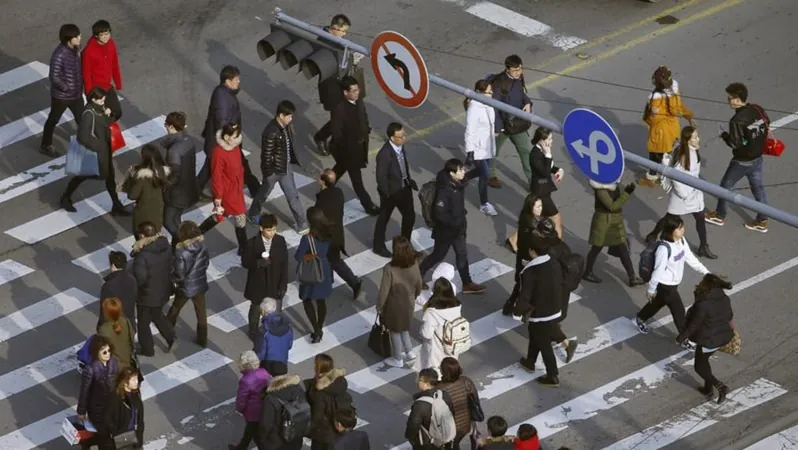
South Korea's Birth Rate Poised for a Historic Rebound in 2024!
2025-01-22
Author: Sarah
Historic Rebound in Birth Rate
SEOUL: For the first time in nearly a decade, South Korea's birthrate is projected to rise in 2024, marking a significant turnaround driven primarily by a surge in marriages delayed during the COVID-19 pandemic. This is promising news for a country that has consistently reported the lowest fertility rates in the world.
Projected Births and Marriage Rates
According to recent government data, the number of newborns is expected to increase by 3% from last year, reaching approximately 220,094 between January and November 2024. This uptick is particularly noteworthy following a challenging year in 2023, when the birth rate plummeted by 7.7%, contributing to an annual fertility rate of a staggering 0.72, the lowest reported globally.
Cultural Shift in Marriage and Parenthood
The rise in births is closely linked to a resurgence in marriage rates, which experienced a dramatic 13.5% increase in the same period, totaling 199,903 marriages. This marks the largest annual increase in marriages since 1980, highlighting a potential shift in societal attitudes post-pandemic.
Changing Attitudes Towards Childbirth
Traditionally, South Korean culture has viewed marriage as a vital stepping stone to parenthood, creating a time lag of about one to two years before couples have children. A government survey from the previous year indicated that 62.8% of South Koreans disapproved of births occurring outside of marriage—though this figure represents a decrease from 77.5% a decade earlier. This evolving mindset could play a crucial role in future fertility trends.
Comparative Trends in Neighboring China
Not only is South Korea seeing a positive shift, but neighboring China is also experiencing a rise in birth rates. In 2024, Chinese newborns are expected to increase by 5.8% to approximately 9.54 million—again attributed to pandemic-related marriage delays.
Government Initiatives to Address Demographic Issues
To address the ongoing demographic crisis, various initiatives were introduced last year, incentivizing young couples to marry and start families. Following the declaration of a "national demographic crisis" by the now-impeached President Yoon Suk Yeol, plans were set forth to establish a new ministry dedicated specifically to tackling low birth rates. Among the measures implemented are substantial financial incentives, including a one-time tax cut of 500,000 won (approximately USD 349.35) for couples marrying between 2024 and 2026.
Challenges Ahead
However, while the momentum of newborns is hopeful, the challenge of sustaining this growth remains. With changing societal values, economic conditions, and the ongoing quest for work-life balance, South Korea's battle against low birth rates is far from over. Will this be the year that South Korea finally turns the tide on its fertility crisis? Only time will tell!


 Brasil (PT)
Brasil (PT)
 Canada (EN)
Canada (EN)
 Chile (ES)
Chile (ES)
 Česko (CS)
Česko (CS)
 대한민국 (KO)
대한민국 (KO)
 España (ES)
España (ES)
 France (FR)
France (FR)
 Hong Kong (EN)
Hong Kong (EN)
 Italia (IT)
Italia (IT)
 日本 (JA)
日本 (JA)
 Magyarország (HU)
Magyarország (HU)
 Norge (NO)
Norge (NO)
 Polska (PL)
Polska (PL)
 Schweiz (DE)
Schweiz (DE)
 Singapore (EN)
Singapore (EN)
 Sverige (SV)
Sverige (SV)
 Suomi (FI)
Suomi (FI)
 Türkiye (TR)
Türkiye (TR)